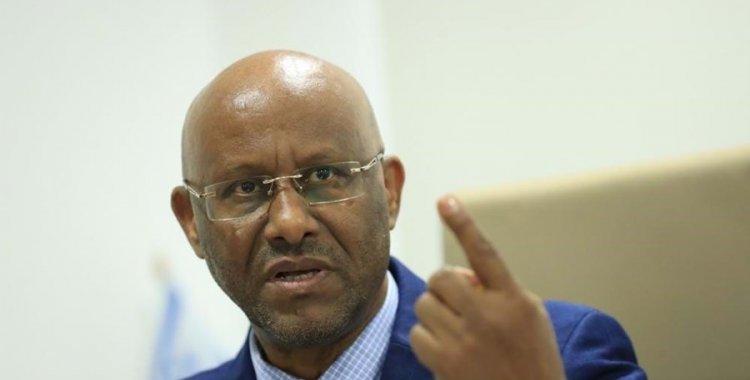The Hebrew diplomat spoke to journalists at a press conference in Luanda, highlighting Israel's firm will to destroy the Palestinian Islamist movement Hamas, as well as the solidarity shown by Western, Asian and African countries, regretting that Angola has not taken a position.
The President, João Lourenço, in his capacity as chairman-in-office of the Southern African Development Community (SADC) on Wednesday condemned the acts of violence in the conflict between Israel and Hamas and called on the parties involved to exercise restraint, but did not do so as Angola's head of state.
"We are good friends of Angola, we regret that there has been no condemnation of this attack," criticized Shimon Solomon, pointing out that other African countries such as Ghana, Kenya or the Democratic Republic of Congo have already done so, "but in Angola, unfortunately we have not yet seen this."
"Our expectation, as we are friends, was that Angola would condemn the attack. We see who friends are in difficult times," he stressed, stating that the SADC communiqué is only a condemnation of the violence, in general and diplomatic terms, without taking a position.
Asked how this will affect relations between the two countries, which have been close, he said that it is necessary to "wait and see what will happen" to know what the future steps will be.
"Of course we are deeply disappointed," he reiterated, stressing that Angola's reaction "was a great surprise."
The conflict was triggered by the surprise attack, Saturday, by the Hamas group, which in addition to deaths took hostages of different nationalities, followed by new attacks and an Israeli response with a siege of the Palestinian enclave, and has already caused at least 1300 deaths in Israel and 1354 in the Gaza Strip, according to official sources of the two parties.
The ambassador also addressed the events of Saturday, October 7, a Jewish holiday, in which Israel suffered "a terrorist attack by Hamas", an entity that he compared to the Islamic State, with which it shares "the same ideology".
An ideology that "is not for Palestine, nor for the territories, nor for human rights" and that is against Jews, Christians and all non-Muslims, he stressed.
"It was not a soldier-to-soldier fight, they slaughtered women and children, they behaved like animals," he lamented, stressing that the government's decision is to "totally destroy Hamas."
In response to the attack, Israel has bombed several Hamas facilities in the Gaza Strip for the past six days in an operation called "Iron Swords" and imposed an all-out siege, cutting off the supply of water, fuel and electricity.
Shimon Solomon recalled that the attack resulted in more than 1200 deaths, Israelis and foreigners, and said that the Israelis value human rights and did not previously want to exert force against the Palestinians who are being used as a shield by Hamas militants infiltrating the population.
"Hamas does not represent the Palestinian people," the diplomat stressed, presenting Israel as a "liberator" of the Palestinians who are also victims of Hamas.
Hamas has controlled the Gaza Strip since 2007 and is classified as a "terrorist group" by the European Union (EU), the United States and Israel.
The Israeli ambassador argued that countries should support each other as a way to defeat terror and that Israel is taking "very radical actions" because it is at war.
"Who attacked whom? It was Hamas that attacked Israel and it was not against the army, it was against innocents (...) what we ask is that you condemn the attack," he urged, adding: "It was Israel who suffered."
On the situation of civilians in the Gaza Strip, he pointed out that Israel targets Hamas targets and not mosques or hospitals, but admitted that there may be "mistakes" because, he said, the Islamist militants are mixed with the population.
He also assured that Israel tries to warn the innocent "to leave their homes" through leaflets and messages, but stressed that "it will be a long and intense war in Gaza".
Asked about humanitarian aid to civilians in that territory, he said that "now it's war" and "only God knows" what will come next.
As for those who defend the Palestinian cause and demonstrate against Israel, he considered them to be "anti-Semitic".
Diplomatic relations between the State of Israel and the Republic of Angola date back to the 1970s, having been interrupted after the October 1973 war, and renewed in 1993, after the signing of the Oslo Accords.
In 1995, the Israeli embassy opened in Luanda, and in 2000, Angola opened an embassy in Tel Aviv.
In 2006, the then President of Angola, José Eduardo dos Santos, made the first official visit to Israel, during which the possibilities of expanding reciprocal trade between the two countries were discussed.
More recently, in February this year, Angola sent a high-level delegation led by the Minister of Higher Education, Science, Technology and Innovation, Maria do Rosário Bragança, to Israel to explore new opportunities for cooperation.
At present, cooperation focuses mainly on activities in the areas of Agriculture, Health, Education, Aviation, Construction, Fisheries, Diamonds, Security and Telecommunications.
Angola has also received millions of euros in Israeli funding channelled into infrastructure projects through the Mitrelli group, which is part of the Menomaddin conglomerate, led by Haim Taib.
The MitrelIi group is present in six countries, including Angola, Ivory Coast, Senegal and Israel, and its main operation is in the Angolan market, where the portfolio of companies includes, among others, Kora (real estate), Owin (electricity, gas, water), Promed (health), New Cognito (Information Technology), Focus Education (education), etc.







